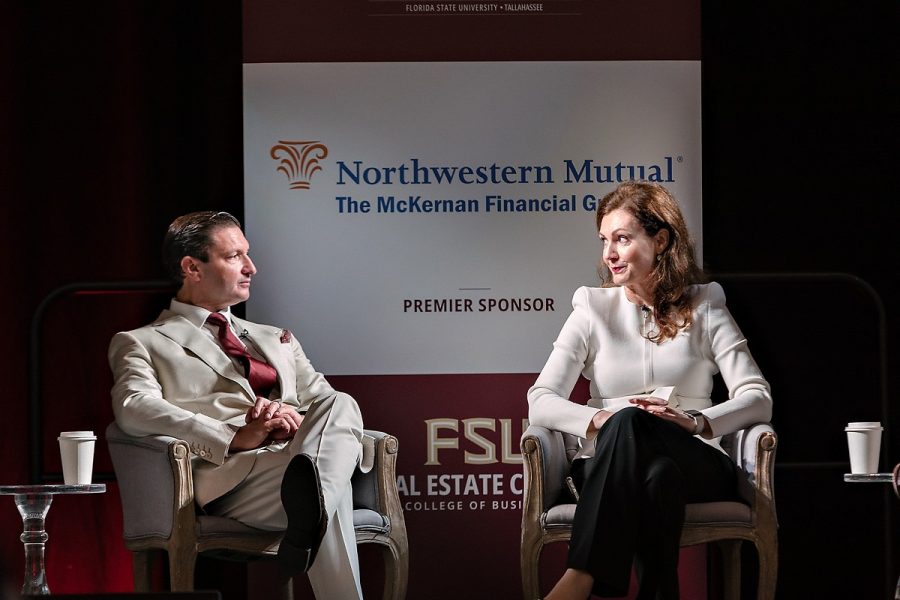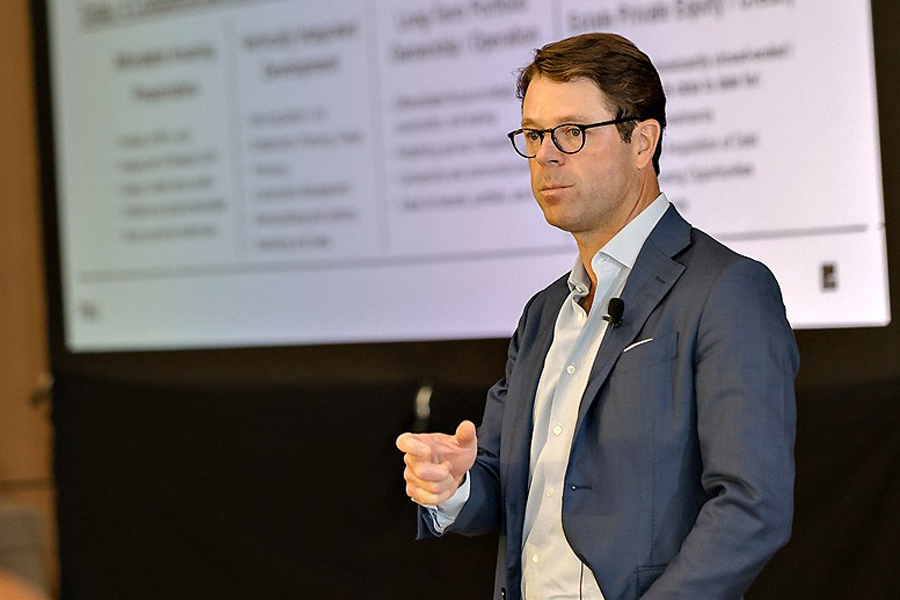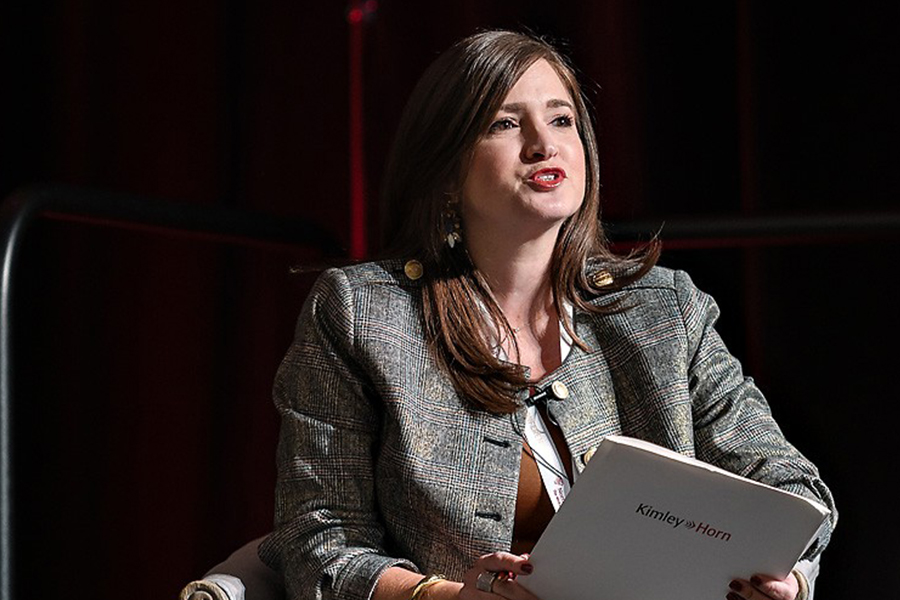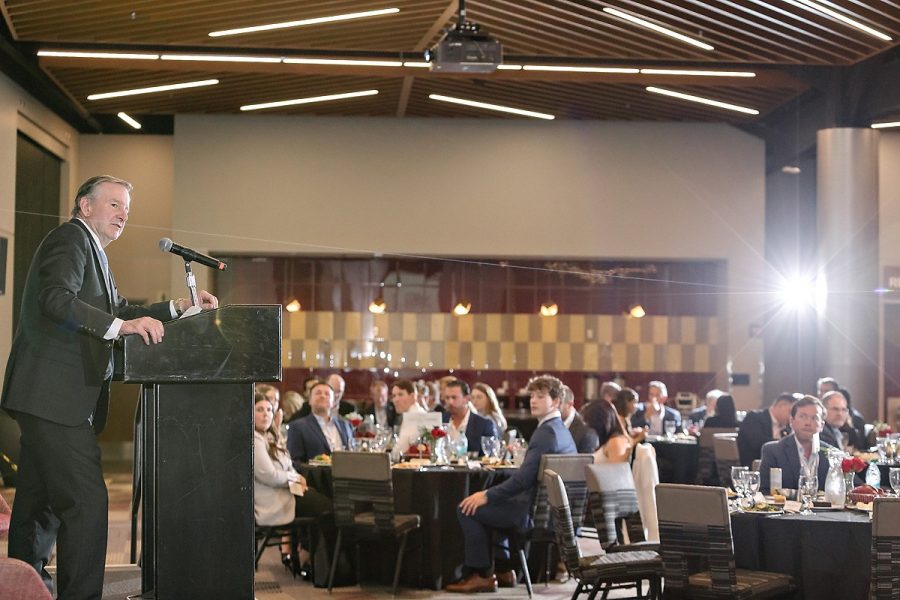
Before he launched into a presentation that focused on the company behind New York City’s Hudson Yards — the largest private real estate development project in U.S. history — real estate development executive Mike Gilbane applauded officials from the Florida State University College of Business and FSU Real Estate Center.
“It’s really inspiring to see what you’re doing with the students; what they’re being exposed to,” Gilbane told audience members last week, referring to student participation in the FSU Real Estate TRENDS Conference. “The network you have developed here, I think, is truly unbelievable. It’s inspiring, and I have no doubt it’s going to contribute incredibly to the industry over time.”
Gilbane, managing director of Related Fund Management for New York-based Related Companies, served as keynote speaker during TRENDS, a world-class business forum that for the 31st year brought together top business leaders to discuss key conditions and developments affecting the real estate industry.
A crowd of about 550 heard from panelists and speakers, including from industry and state government, who discussed global and domestic investor trends, capital markets insights and the effects of Florida’s aerospace infrastructure on real estate.
The crowd also heard from Michael Hartline, dean of the FSU College of Business, and Yvonne Baker, the Brett C. Lindquist Executive Director of the FSU Real Estate Center. FSU business alumnus Ben Macfarland (BS Real Estate ’03), chair of the FSU TRENDS Conference Committee and CEO of SROA Capital in West Palm Beach, spoke to attendees and moderated a panel on global real estate investment.
Attendees included about 165 students from FSU, Florida A&M University and the University of Wisconsin-Madison’s No. 1-ranked real estate program. The Wisconsin students joined forces with students from FSU’s real estate program, which is ranked No. 6 among public schools and No. 9 overall, in a case competition. Students also participated in a career fair that featured representatives of top real estate companies and other businesses.
“It was fun to apply what we’ve learned in the classroom to a real-world situation,” said Adriana Gjergji, a senior real estate major who participated on the winning team in the case competition. “It was a great experience to challenge ourselves and be under pressure but also to be comfortable with the support of FSU’s real estate program.”
About the Friday panel conversations, she said: “This was my second year attending the TRENDS Conference, and both times I felt like I gained valuable experience and made so many new connections. It was great to hear from industry professionals about their experiences and get their insight on markets, assets, growth and the industry as a whole.”
In a Monday post on the social platform X, Greenberg Traurig, an international law firm and a TRENDS Conference sponsor, hailed the event for its “great insights and energy” and congratulated the College of Business and FSU Real Estate Center “on another outstanding event bringing together students, industry leaders and experts to discuss the forces transforming real estate today.”
Florida’s zooming space industry
The panel on Florida’s aerospace industry explored real estate strategies that support it and touted the benefits to Florida’s economy. Chase Foster, senior research and project engineer for aerospace at FSU InSPIRE, said the university initiative “aims to, among other things, foster collaboration, develop a highly skilled workforce, deliver high-end research and provide state-of-the-art facilities, including support of the thriving aviation and aerospace ecosystem in Northwest Florida.” He said FSU InSPIRE’s work in aerospace “initially will target advanced manufacturing and high-speed wind-tunnel testing.”
A presentation by Julia Black, vice president of advanced programs for Space Florida, the state’s aerospace finance and development authority, illuminated Florida’s space transportation infrastructure, including seaports and airports around the state. She also touted major representative agreements with Amazon, Blue Origin, SpaceX and Northrop Grumman, among other companies.
“The significance of the aerospace industry in Florida cannot be overstated,” said panel moderator Eileen Vélez Vega, strategic infrastructure director at engineering and design consultant Kimley-Horn. “With major spaceports, Florida has become a hub for both public and private space operations. These facilities are not only launching rockets into space but also propelling the state’s economy forward.”
‘Building a city in the city’
In his keynote presentation, Gilbane shared the background of Related Companies and the development of Hudson Yards, a 28-acre mixed-use project built on a former Manhattan rail yard. The project includes more than 18 million square feet of high-end residential and commercial space, new office towers, shops, restaurants, public plazas and a cultural and performing arts center called The Shed.
Gilbane said the project stands as the result of New York City’s failed bid in the early 2000s to host the 2012 Summer Olympics, which took place in London. The city’s plan included rezoning the old rail yard for commercial development, including construction of a stadium, and the extension of a subway line that would have given Olympic athletes and spectators access to key points in the city.
After the failed bid, the city — crucially — kept its plans to extend the subway line, and the Related Companies seized the opportunity to develop Hudson Yards in the space of the proposed stadium. The company launched the project in 2014 and opened its first phase, including a public plaza and retail center, in 2019.
Gilbane emphasized the advantage in such larger-scale public-private partnerships of securing “these pieces of land at a fixed value,” with “a substantial amount of effort and investment in de-risking the deal and adding value.”
“Such projects require knowing more than real estate,” said Michael T. Fishman, vice chair of Greenberg Traurig and moderator of Gilbane’s presentation. “It’s knowing the politicians. It’s knowing the entitlements. It’s putting the whole thing together as a long-term project that typically outlasts economic cycles. So, you have to think really long term in terms of your capital needs.”
He added: “This is truly building a city in the city. You want to think about it that way.”
The power of full integration
Gilbane pointed to multiple strengths of Related Companies, which boasts a $70 billion real estate portfolio, mostly in affordable housing. Strong points include a long-term ownership mentality that inspires investment in durable construction materials and, as an owner-operator, personalized customer service.
Also, Gilbane said, in-house processes including development, construction, finance and management allow the company to control multiple stages of the supply chain.
He said to audience members: “I think the students will get some perspective on this as they start to work in the industry and underwrite more things: There’s more risk that you can’t control in development than there is risk that you can (control), whether that’s economic cycles or interest rates, particularly given how capital-intensive these projects are and given the time frame.”
He added: “We think if we can control the full supply chain, we’re going to be able to manage our destiny much better than others.”









